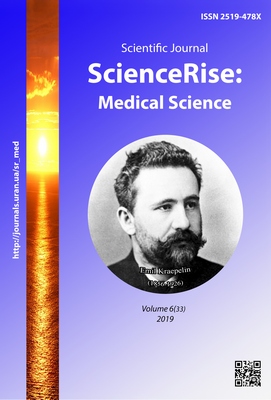Cognitive violations of persons with alcoholic encephalopathy and paroxismal states
DOI:
https://doi.org/10.15587/2519-4798.2019.185782Keywords:
alcohol addiction, alcoholic encephalopathy, paroxysmal states, cognitive impairment, abuse of alcoholic drinks and alcohol-containing substancesAbstract
The article addresses the issues of cognitive impairment among persons with alcohol dependence, aggravated by alcoholic encephalopathy and paroxysmal conditions.
The aim of the study was to identify the levels of impaired short-term memory, to identify cognitive impairment of patients with alcohol addiction with alcoholic encephalopathy and paroxysmal conditions.
Materials and methods: 132 people from the contingent of alcohol addicts (AА) and from the contingent of healthy and 4 comparison groups have been identified and examined over the two years on the basis of KNP CHOR «Regional Clinical Narcological Hospital No. 3». The following techniques were used to assess psychosocial and cognitive impairment: “Jacobson Short-Term Memory Measurement Technique”; "The methodology for determining the index of short-term memory proposed by L. S. Muchnik and V. M. Smirnov (1968)".
Result. According to the results of the researches, the cognitive and mnemonic sphere of persons with AА, AE and PS were expressed in the form of significant reduction of short-term memory and cognitive impairment. The presence of significantly "deeper" and "gross" degenerative-organic lesions of the central nervous system in chronic alcoholic lesions with the development of alcoholic encephalopathy and paroxysmal states of alcoholic genesis has been proved.
Conclusions. Thus, the obtained research results only confirm the data of numerous world sources on the development of cognitive decline in individuals with alcohol dependence
References
- Egorchenko, S. P. (2014). Alkogolnaia zavisimost: problema biogeneticheskaia ili psikhosocialnaia? Sovremennye aspekty. Vestnik ONU imen I. I. Mechnikova. Psikhologiia, 19 (2 (32)), 122–128.
- Sivolap, Y. P. (2014). Alcohol abuse and related disorders treatment of alcohol dependence. Neurology, Neuropsychiatry, Psychosomatics, 6 (3), 4–9. doi: http://doi.org/10.14412/2074-2711-2014-3-4-9
- Fadeeva, O. V. (2008). Alkogolnaia encefalopatiia v molodom vozraste: kliniko-terapevticheskie i socialno-demograficheskie osobennosti. Moscow, 165.
- Firsenkova, S. V., Khaitzhanov, A. (2014). Problemy «pianoi» prestupnosti v sovremennoi Rossii. Vestnik Penzenskogo gosudarstvennogo universiteta, 2 (6), 56–59.
- Shaiakhmetova, G. S. (2018). Problema alkogolia, tabakokureniia i narkomanii sredi podrostkov i molodezhi. Ozdorovitelnaia fizicheskaia kultura molodezhi: aktualnye problemy i perspektivy. Minsk, 1, 405–408.
- Mcintosh, C. (2004). Alcohol and the nervous system. Journal of Neurology, Neurosurgery & Psychiatry, 75 (3), 16–21. doi: http://doi.org/10.1136/jnnp.2004.045708
- Mechtcheriakov, S., Brenneis, C., Egger, K., Koppelstaetter, F., Schocke, M., Marksteiner, J. (2007). A widespread distinct pattern of cerebral atrophy in patients with alcohol addiction revealed by voxel-based morphometry. Journal of Neurology, Neurosurgery & Psychiatry, 78 (6), 610–614. doi: http://doi.org/10.1136/jnnp.2006.095869
- Olgiati, P., Liappas, I., Malitas, P., Piperi, C., Politis, A., Tzavellas, E. O. et. al. (2007). Depression and Social Phobia Secondary to Alcohol Dependence. Neuropsychobiology, 56 (2-3), 111–118. doi: http://doi.org/10.1159/000112952
- Rajendram, R., Lewison, G., Preedy, V. R. (2005). Worldwide alcohol-related research and the disease burden. Alcohol and Alcoholism, 41 (1), 99–106. doi: http://doi.org/10.1093/alcalc/agh238
- Scheurich, A. (2004). Neuropsychological status of alcohol-dependent patients: increased performance through goal-setting instructions. Alcohol and Alcoholism, 39 (2), 119–125. doi: http://doi.org/10.1093/alcalc/agh026
Downloads
Published
How to Cite
Issue
Section
License
Copyright (c) 2019 Tatiana Roshchupkina

This work is licensed under a Creative Commons Attribution 4.0 International License.
Our journal abides by the Creative Commons CC BY copyright rights and permissions for open access journals.
Authors, who are published in this journal, agree to the following conditions:
1. The authors reserve the right to authorship of the work and pass the first publication right of this work to the journal under the terms of a Creative Commons CC BY, which allows others to freely distribute the published research with the obligatory reference to the authors of the original work and the first publication of the work in this journal.
2. The authors have the right to conclude separate supplement agreements that relate to non-exclusive work distribution in the form in which it has been published by the journal (for example, to upload the work to the online storage of the journal or publish it as part of a monograph), provided that the reference to the first publication of the work in this journal is included.









